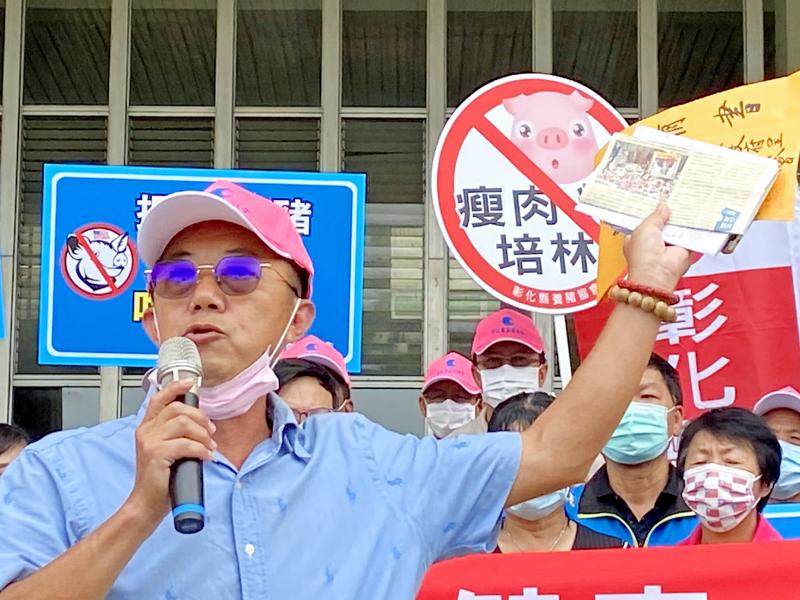The Chinese Nationalist Party (KMT) yesterday raised concerns over the new country-of-origin labels of pork products to be introduced once pork from the US containing ractopamine enters the domestic market next year, while some farmers are planning protests against the policy in Taipei.
President Tsai Ing-wen (蔡英文) on Friday last week announced that Taiwan would ease restrictions on imports from the US of pork containing ractopamine residue and beef from cattle aged 30 months or older, with the new policy expected to take effect from January next year.
At a news conference in Taipei, KMT Culture and Communications Committee chairwoman Alicia Wang (王育敏) said that there might be “loopholes” in the labeling.

Photo: CNA
Referring to pork fillings for dumplings as an example, she asked whether a product should be labeled as originating in Taiwan or the US, if it contains both domestic pork and imported pork containing ractopamine.
“So far, the Ministry of Health and Welfare has not informed the public how [such products] should be labeled,” Wang said, adding that if labels only were to display the countries of origin, they would still not indicate if the pork contains ractopamine.
“The proportion of Taiwanese who eat pork is very high,” Wang said. “Each of our three daily meals involves pork products.”

Photo: Chang Tsung-chiu, Taipei Times
The Ministry of Health and Welfare was the “spokesperson for ractopamine US pork,” she said, adding that it should instead safeguard food standards.
The KMT is to continue to “strongly supervise” the central government on the matter, Wang said.
Committee deputy chairman Cheng Chao-hsin (鄭照新) said that if it remains unclear to consumers whether a pork product contains ractopamine, they might consume less pork, which would hurt domestic farmers.
Cheng called on the government to specify tolerance levels of ractopamine residue in pork for children.
Seperately, at the KMT’s weekly Central Standing Committee meeting, KMT Chairman Johnny Chiang (江啟臣) said the party would not rule out protesting the government’s decision.
Tsai’s announcement to allow the imports was made without Legislative Yuan supervision, communication with local governments or regard for the impact the new policy might have on the domestic industry and public health, Chiang said.
The circumstances have not, as the Democratic Progressive Party (DPP) says, changed, Chiang said.
While the DPP claims that the government is striving for a free-trade agreement with the US, progress on the matter could not be seen, he said.
Meanwhile, farmers in Changua County said that they are opposed to the new policy and appealed to the county government.
US pork with ractopamine affects public health and local pig farmers, Changhua County Pig Farmers’ Associaiton chairman Liao Hsueh-liang (廖學良) said, adding that the association insists on a zero tolerance policy for the additive.
Farmers do not rule out the possibility of protesting the policy in Taipei, Liao said.
There are more than 600 hog farms in the county, raising a total of 750,000 pigs and generating revenues of more than NT$10 billion (US$338.7 million) annually, Changhua County Commisioner Wang Hui-mei (王惠美) of the KMT said.
Additional reporting by CNA

The Grand Hotel Taipei on Saturday confirmed that its information system had been illegally accessed and expressed its deepest apologies for the concern it has caused its customers, adding that the issue is being investigated by the Ministry of Justice Investigation Bureau. The hotel said that on Tuesday last week, it had discovered an external illegal intrusion into its information system. An initial digital forensic investigation confirmed that parts of the system had been accessed, it said, adding that the possibility that some customer data were stolen and leaked could not be ruled out. The actual scope and content of the affected data

DO THEY BITE IT? Cats have better memories than people might think, but their motivation is based entirely around the chance of getting fed Cats can remember the identity of the people who fed them the day before, Taipei-based veterinarians said on Friday, debunking a popular myth that cats have a short memory. If a stray does not recognize the person who fed them the previous day, it is likely because they are not carrying food and the cat has no reason to recognize them, said Wu Chou Animal Hospital head Chen Chen-huan (陳震寰). “When cats come to a human bearing food, it is coming for the food, not the person,” he said. “The food is the key.” Since the cat’s attention is on the food, it

A New York-based NGO has launched a global initiative to rename the nation’s overseas missions, most of which operate under the name "Taipei," to "Taiwan Representative Office (TRO)," according to a news release. Ming Chiang (江明信), CEO of Hello Taiwan, announced the campaign at a news conference in Berlin on Monday, coinciding with the World Forum held from Monday through Wednesday, the institution stated in the release. Speaking at the event, Democratic Progressive Party Legislator Huang Jie (黃捷) said she believed this renaming campaign would enable the international community to see Taiwan

TOO DANGEROUS: The families agreed to suspend crewed recovery efforts that could put rescuers in danger from volcanic gases and unstable terrain The bodies of two Taiwanese tourists and a Japanese pilot have been located inside a volcanic crater, Japanese authorities said yesterday, nearly a month after a sightseeing helicopter crashed during a flight over southwestern Japan. Drone footage taken at the site showed three bodies near the wreckage of the aircraft inside a crater on Mount Aso in Kumamoto Prefecture, police and fire officials said. The helicopter went missing on Jan. 20 and was later found on a steep slope inside the Nakadake No. 1 Crater, about 50m below the rim. Authorities said that conditions at the site made survival highly unlikely, and ruled